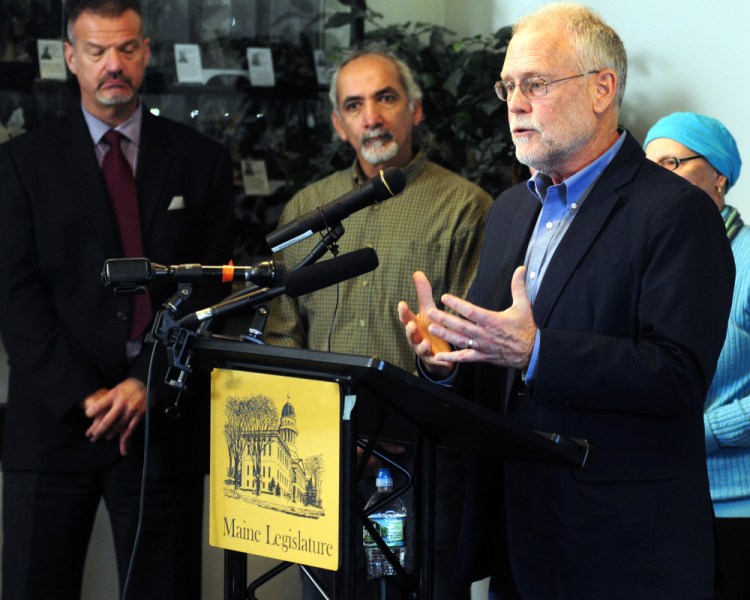AUGUSTA — Meaghan Carlson worries how proposed changes to social service rules would affect the quality of life for a 78-year-old uncle who has intellectual disabilities. Cullen Ryan frets about the future of his 20-year-old autistic son when he’s no longer alive to help care for him.
Carlson and Ryan were two representatives of many families and advocates of adults with intellectual disabilities who decried potential changes to Maine Department of Health and Human Services rules in Augusta Wednesday. The rules govern how services that help patients with daily living are delivered.
The 50 pages of new rules are vague and complex and would result in reimbursement cuts that would affect at least 5,000 people, the families said at a State House news conference before an afternoon public hearing. The earliest the rules could go into effect would be January.
Ray Nagel, executive director of the Independence Association, a Brunswick nonprofit that provides care to adults with disabilities, said proposed changes to a funding formula would reduce reimbursements to agencies by 7.5 percent.
Nagel said such a rate change would result in cutbacks to staffing at the agency, which means a reduced ability to provide services.
“When we can’t pay people to work for us, we can’t send a worker to people who need services,” Nagel said.
When asked whether the proposal would result in reimbursement cuts, DHHS spokeswoman Samantha Edwards said she couldn’t discuss the details of the proposed changes because of the agency’s “rulemaking process,” but she said the changes will improve services.
“It is once again providers using scare tactics and misinformation to concern individuals and their families,” Edwards said. “This is the department working to better serve the individual.”
The rules changes would affect MaineCare Section 21, which provides support services for adults with intellectual disabilities. The services help the clients – mostly living in group homes – with daily living tasks, such as personal hygiene, meals, laundry, running errands and transportation.
MaineCare is the state’s name for Medicaid, a health program that serves low-income and disabled Mainers, using a blend of federal and state tax dollars.
Pete Plummer, chief operating officer of Woodfords Family Services in Portland, a nonprofit social service agency, said because reimbursement rates are so low and have been cut more than 10 percent since 2007, the jobs to help adults with intellectual disabilities are low-paying. A 7.5 percent cut on top of that would be devastating to statewide services, he said.
“We already have 40 to 50 percent turnover because we can’t retain employees,” Plummer said.
Plummer said the rules were so indecipherable when released in September that it took weeks to figure out what was going on. He said DHHS had not been forthcoming about the changes, which will do nothing to improve efficiencies or services.
Edwards, however, said there was a lot of communication among DHHS, families and nonprofits.
“In reality, the department has spent several months communicating with individuals served under Section 21, their families, guardians and providers. We had five forums statewide in May along with weekly call-ins through August. All comments and concerns are taken under consideration when crafting the rule,” Edwards said.
A previous attempt to change Section 21 rules in January was withdrawn by DHHS after a public outcry. The families talked about how difficult it is on the patients to frequently have to worry about changing caseworkers.
Ryan, who works for Community Housing of Maine in Portland, said his 20-year-old son has had 37 care workers because they keep leaving for better-paying jobs. Ryan said it’s already difficult for his son to have such constant changes, and having fewer workers or paying them less will only worsen the problem.
“Shortchanging his workers so they all go away will not help my son,” Ryan said. “Instead it will force either me or his mother out of our gainful employment.”
Carlson, of Gardiner, said that without assistance, her uncle would flounder.
And David Cowing of Woolwich said his autistic son needs supportive services to thrive.
“Please don’t force cuts in staff pay for the caregivers who do the challenging work of supporting people with disabilities, like my son,” Cowing said.
Send questions/comments to the editors.




Comments are no longer available on this story